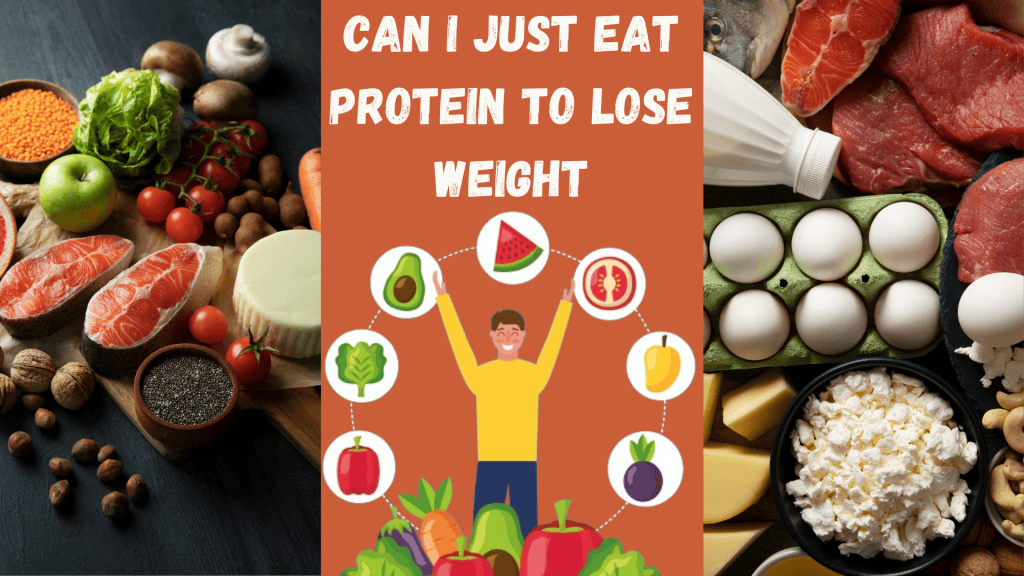Yes, eating protein to lose weight can be effective, provided that overall calorie intake is less than the burn while keeping metabolism, appetite, and weight-regulating hormones in balance. Some studies have shown that people can lose about the same amount of weight whether they get 25% or 15% of their total calories from protein, as long as they keep their calorie intake low. Eating protein to lose weight doesn’t directly cause weight loss, but its satiating effect can help curb hunger and prevent overeating. Eating only protein to lose weight might make you feel full longer. As a result, this could support your efforts to lose weight by making you consume fewer calories overall, and this will eventually answer the query, “Can I just eat protein to lose weight ?”
Moreover, the practice of consuming protein for weight loss is a powerful tool in increasing thermogenesis, the process by which your body generates heat and burns calories. This thermic effect of food (TEF) is notably higher for protein (20-30%) than for carbohydrates (5-10%) and fats (0-3%). Consequently, your body expends more energy to digest protein compared to other macronutrients. A study has shown that increasing protein intake to 30% of daily calories can rev up metabolism and boost calorie burn by 80-100 calories daily. Introducing a high-protein diet into your meals can induce a prolonged feeling of fullness, which can facilitate weight loss by reducing overall calorie consumption. However, it’s essential to remember the significance of a balanced diet because neglecting other important nutrients can compromise your overall health and well-being.
Let’s figure out the answer to our frequent question: Can I just eat protein to lose weight?
Will I Lose Weight Eating Only Protein?
Research shows that protein is important to maintaining a healthy body weight, which reduces cravings and hunger, but protein isn’t a miracle cure for weight loss because losing weight by eating fewer calories than you burn is needed, and it will not lead to the answers to “Can I just eat protein to lose weight?” solely. High-protein diets can help you feel full and eat fewer calories overall, but only eating protein alone without considering other nutrients and your total calorie intake will not be enough to lose weight.
1. Importance of a Balanced Diet
Studies have shown how important it is to eat a balanced diet, and there was one research that said high-protein diets could make you lose weight, but this happens mostly because people eat fewer calories overall, not just because they are eating more Protein rich foods. In a clinical study with 65 people who were overweight or obese, those following a high-protein diet (30% of their calories from protein) lost an average of 4.5 kg in 12 weeks. This is compared to the group on a normal protein diet (15% of their calories from protein), who lost about 3.6 kg during the same time period. Protein helps you feel full by impacting hunger hormones like ghrelin and increases thermogenesis, which means your body makes heat and burns more calories that way.
2. Nutritional Deficiencies
Depending on only protein to lose weight can cause a lack of other important nutrients in your body, which needs many different types of nutrients to function well. For example, vitamins and minerals from Protein rich fruits and vegetables are very important for the immune system, bone strength, and the production of energy in the body. Research has found that after only eight weeks, people who ate a high-protein diet but a low-carbohydrate diet had shortages of key nutrients like vitamin C, folate, and magnesium. Carbohydrates are the body’s main energy source, are very important for activities that require a lot of effort, and are also necessary for the brain to work well. Fats, mostly unsaturated fats, are crucial because they help make hormones, keep cell membranes strong and healthy, and let us absorb fat-soluble vitamins like A, D, E, and K.
3. Negative Health Effects of Excess Protein
Also, only eating protein to lose weight can be bad for health, which puts lots of pressure on the kidneys. They are very important because they help to process protein, and if you eat only protein to lose weight, the kidneys have to work really hard. This can make them tired and could cause kidney problems after some time. A study that answered the most common query, “Can i just eat protein to lose weight?” states that eating lots of protein for a long time might make kidney function worse for people who already have kidney problems. Also, diets with high amounts of protein often do not have enough fiber, which can cause digestion issues like constipation. A high-protein diet but low in fiber caused more people to have constipation and stomach problems.
In conclusion, protein may help with weight loss because it makes you feel full and helps burn calories. However, it is important to have a balanced diet chart that includes all necessary nutrients. Controlling the total amount of calories you eat and having variety in your food choices is essential for reaching healthy and lasting weight loss goals.
How to Lose Weight Just by Eating Protein
Losing weight by concentrating on eating more protein requires a careful plan for your food and lifestyle. It is important to ensure that the calories you eat are less than what your body uses up in energy. This guide will explore how adding lean protein sources, nutrient-dense foods, and physical activity can help you lose weight.
Understanding Protein and Its Role in Weight Loss
Protein is a macronutrient essential for building and repairing tissues, making enzymes and hormones, and supporting overall health. It has a high thermic effect, meaning your body burns more calories digesting protein compared to fats and carbohydrates. Research indicates that protein’s thermic effect is around 20-30% of its energy content, compared to 5-10% for carbohydrates and 0-3% for fats. This means eating protein can help you burn more calories, including when you’re resting, which makes it very useful for losing weight.
Lean Protein Sources
- Chicken Breast: Skinless chicken breast is a versatile and low-fat protein option. A 100-gram serving provides approximately 31 grams of protein and only 165 calories. It’s a great choice because it’s easy to prepare and can be included in various dishes.
- Fish: Fish like salmon, cod, and tuna provide high-quality protein and essential omega-3 fatty acids. For instance, a 100-gram serving of salmon offers about 20 grams of protein and 208 calories, along with heart-healthy fats; including fish in your diet benefits weight loss and cardiovascular health.
- Tofu: A plant-based protein that is low in calories and high in protein. A 100-gram serving of firm tofu contains about 8 grams of protein and 76 calories. Tofu is perfect for vegetarians and those looking to reduce meat consumption.
- Legumes: Beans, lentils, and chickpeas are excellent sources of protein and fiber. For example, 100 grams of cooked lentils provide 9 grams of protein and 116 calories. Legumes are filling and can help you stay full longer, reducing overall calorie intake.
The Importance of Calorie Intake
Calorie intake refers to how many calories you eat and drink from foods and beverages. To lose weight, your calorie intake must be lower than your energy expenditure, which is the total number of calories your body needs to maintain its current weight. This can be achieved by not only eating protein to lose weight but also by portion control and low calorie foods:
- Portion Control is managing the quantity of food you consume at each meal. Studies show that smaller portion sizes can significantly reduce calorie intake without affecting satisfaction. This means you can eat less but still feel full and satisfied.
- Choosing Low-Calorie Foods: Opting for foods that are nutrient-dense but low in calories. For example, non-starchy vegetables like broccoli and spinach are low in calories but high in vitamins and minerals, making them ideal for weight loss diets.
Balanced Diet with Nutrient-Dense Foods
- Vegetables: Rich in vitamins, minerals, and fiber, vegetables help with satiety and weight management. A study found that increased vegetable intake is associated with lower body weight and reduced risk of weight gain. For instance, 100 grams of broccoli contains 2.8 grams of protein, 34 calories, and a wealth of vitamins, such as vitamins C and K. Including a variety of vegetables ensures you get a broad range of nutrients necessary for overall health.
- Fruits: Provide essential nutrients and fiber while being relatively low in calories. For instance, a medium apple has about 95 calories, 0.5 grams of protein, and 4 grams of fiber. Fruits can satisfy sweet cravings while providing vitamins and antioxidants.
- Whole Grains: Whole grains like oats, quinoa, and brown rice offer fiber and important nutrients. Consumption of whole grains has been linked to lower body weight and reduced belly fat. For example, 100 grams of cooked quinoa contains 4.4 grams of protein, 120 calories, and high amounts of fiber and essential minerals. Whole grains help maintain stable blood sugar levels, preventing hunger pangs.
Hydration and Physical Activity
- Suppress Appetite: Sometimes, thirst is mistaken for hunger. Research shows that drinking water before meals can reduce calorie intake. It can also help you eat less because you feel fuller.
- Boost Metabolism: Water is necessary for metabolic processes. Studies suggest that drinking 500 ml of water can increase metabolic rate by 30% for about 30-40 minutes. Staying hydrated ensures your body functions optimally, including burning calories efficiently.
Regular physical activity
- Burning Calories: Exercise increases your overall calorie expenditure, and it is recommended that you do at least 150 minutes of moderate-intensity weekly exercise for weight loss. Exercise not only burns calories but also improves overall health.
- Building Muscle: Strength training helps build muscle, which can increase your basal metabolic rate. Research indicates that muscle tissue burns more calories at rest compared to fat tissue. Building muscle through strength training can help you burn more calories even when you’re not exercising.
Eating protein to lose weight, one must only focus on lean protein sources while keeping your calorie intake lower than your energy expenditure, including nutrient-dense foods like vegetables, fruits, and whole grains for a balanced diet. Stay hydrated and exercise regularly to enhance your weight loss efforts. By following these strategies, you can achieve a healthier and more sustainable weight loss, and this will also answer How much protein needed per day.
How Does Protein Help with Weight Loss
Protein is an important nutrient that helps with weight loss. This article looks into different ways protein helps with weight loss and answers the budding query, “Can i just eat protein to lose weight?” like its heat effect, how it makes you feel full, and how it keeps muscle from breaking down. Knowing these things can help you make a good long-term weight loss plan while focusing on only protein to lose weight.
- Thermic Effect of Protein
- Protein and Satiety
- Preservation of Muscle Mass
- Healthy sources of protein
1. Thermic Effect of Protein
The Thermic Effect of Food (TEF) refers to the energy required to digest, absorb, and metabolize nutrients. Protein has a higher TEF compared to fats and carbohydrates, meaning that the body spends more calories processing protein. Studies have demonstrated that digesting protein can raise metabolic rate by 15-30%, while for carbohydrates, it is 5-10%, and for fats, only about 0-3%. This higher energy use helps to create a larger calorie shortfall, which is important for losing weight. Consuming cold-water fish like salmon and mackerel provides high-quality protein and boosts TEF due to the omega-3 fatty acids, which have been shown to enhance calorie burning and reduce fat storage.
2. Protein and Satiety
Understanding the role of protein in weight loss and muscle preservation is crucial. Protein, the most satiating macronutrient, significantly manages hunger and reduces total calorie consumption. High-protein diets have been shown to curb hunger and lower calorie intake throughout the day. For instance, a study revealed that increasing protein intake from 15% to 30% of total calorie consumption led to a daily reduction of 441 calories, resulting in noticeable weight loss over 12 weeks. Whey protein, in particular, influences satiety hormones such as GLP-1 and GIP, which suppress hunger and promote fullness.
3. Preservation of Muscle Mass
During weight loss, it is very important to maintain muscle mass because muscle tissue burns more calories than fat tissue, even at rest. Preserving muscle mass helps maintain a healthy metabolism and prevent rapid weight gain once the diet ends. Studies show that eating more protein can maintain lean body mass while losing weight. For example, a study shows that participants on a high-protein diet lost more fat and retained more muscle mass compared to those on a lower-protein diet. Eating different types of protein together, like casein and whey, can improve muscle building and breakdown. This mix gives both quick and long-lasting amino acids, which helps keep muscles strong during weight loss.
4. Healthy sources of protein
Including high-quality protein sources in your diet is essential for maximizing the benefits of protein for weight loss. Lean meats, fish, dairy products, legumes, and plant-based proteins like tofu and quinoa are excellent options. Edamame and lentils are high in protein and rich in fiber, which further enhances satiety and supports digestive health, contributing to more effective weight loss.
The best amount of protein for losing weight can change depending on the person, but general advice is to eat 1.2 to 2.2 grams per kilogram of body weight each day. This range helps you feel full, boosts how much energy your body uses (thermogenesis), and keeps muscles from breaking down. Eating protein to lose weight in equal amounts over different meals, instead of eating most at dinner time, can help improve muscle building and body shape when losing weight.
Protein has many important roles in weight loss, such as increasing calorie expenditure, promoting satiety, and preserving muscle mass. Individuals can design effective weight loss strategies that lead to sustainable results by understanding and leveraging these benefits. Including good protein foods and following suggested intake amounts is important for reaching and keeping a healthy weight.
Expert Review on Can I Just Eat Protein to Lose Weight?
Dr. Amit Kochar, a certified nutritionist and health expert, refers to high-protein diets essential for muscle repair and growth. However, relying only on them for weight loss isn’t practical or recommended. Dr Amit highlights that eating only protein can cause nutritional imbalances. Our bodies need various nutrients from different food groups, including carbohydrates and fats. Carbohydrates are crucial for energy, especially for brain function, and healthy fats are important for hormone production and cellular health. Dr. Amit also points out the importance of caloric balance in weight loss. A study in Cell Metabolism found that people who ate too many calories, regardless of whether they came from protein, fat, or carbs, gained weight. Dr Amit focuses on the importance of a holistic approach to dieting, focusing on balanced nutrition and sustainable lifestyle changes instead of extreme dietary restrictions.
References
Hansen, Thea T. 2021. “Are Dietary Proteins the Key to Successful Body Weight Management? A Systematic Review and Meta-Analysis of Studies Assessing Body Weight Outcomes after Interventions with Increased Dietary Protein.” MDPI. https://www.mdpi.com/2072-6643/13/9/3193.
Karger, S. 2017. “Effect of a High-Protein Diet versus Standard-Protein Diet on Weight Loss and Biomarkers of Metabolic Syndrome: A Randomized Clinical Trial.” NCBI. https://www.ncbi.nlm.nih.gov/pmc/articles/PMC5644969/.
“The role of protein in weight loss and maintenance.” n.d. PubMed. Accessed July 1, 2024. https://pubmed.ncbi.nlm.nih.gov/25926512/.
FAQs
1. Does protein help burn belly fat?
Protein also raises your metabolic rate and helps you to retain muscle mass during weight loss. Many observational studies show that people who eat more protein tend to have less abdominal fat than those who eat a lower-protein diet.
2. What happens if you eat a high-protein diet without exercise?
You might experience digestive issues. Your body needs the right amount of protein and regular exercise to keep your digestive system in good shape. Without this balance, you might experience disruptions in how your body processes what you eat.
3. Will I gain weight if I only eat protein?
If you consume more protein but don’t work out, you’re still likely to gain weight due to increased calorie intake. However, the resulting weight gain is likely due to fat versus added muscle mass. More muscle mass adds to overall body weight, and muscle is denser than fat.
4. Can you lose weight by eating only protein?
Protein does not cause weight loss, but a diet high in protein will keep you from feeling hungry for longer. Meals that keep you full for a long time help you lose weight. Proteins are the most satisfying of the macronutrients in food.









